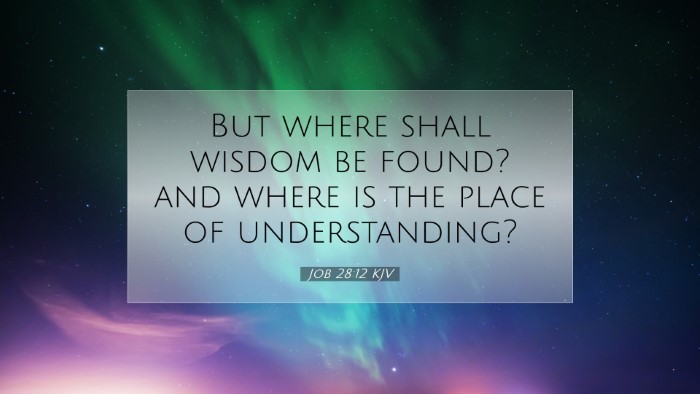Old Testament
Genesis Exodus Leviticus Numbers Deuteronomy Joshua Judges Ruth 1 Samuel 2 Samuel 1 Kings 2 Kings 1 Chronicles 2 Chronicles Ezra Nehemiah Esther Job Psalms Proverbs Ecclesiastes Song of Solomon Isaiah Jeremiah Lamentations Ezekiel Daniel Hosea Joel Amos Obadiah Jonah Micah Nahum Habakkuk Zephaniah Haggai Zechariah MalachiJob 28:12
Job 28:12 KJV
But where shall wisdom be found? and where is the place of understanding?
Job 28:12 Bible Commentary
Commentary on Job 28:12
Job 28:12 (KJV): "But where shall wisdom be found? and where is the place of understanding?"
Introduction
The profound question posed by Job reflects a universal quest for wisdom and understanding, pivotal themes throughout the Book of Job. In this verse, Job, amidst his suffering, seeks to uncover the nature and location of true wisdom. The inquiry invites the reader to explore the depths of divine knowledge compared to human understanding.
Insights from Matthew Henry
Matthew Henry highlights that Job's inquiry stems from a deep acknowledgment of human limitations. He emphasizes that while material wealth and earthly treasures can be discovered and measured, true wisdom remains elusive.
- The Nature of Wisdom: Henry defines wisdom not merely as knowledge but as practical insight into the nature and purposes of God. It surpasses human intellect and embodies a divine attribute.
- Human Elusiveness: The question illustrates that wisdom cannot be captured by human endeavor; it is a gift from God. Henry stresses the futility of autonomous pursuits for wisdom devoid of divine revelation.
- God as the Source: Ultimately, Henry points to God as the ultimate source of wisdom, echoing the sentiments expressed throughout the scripture that "the fear of the Lord is the beginning of wisdom" (Proverbs 9:10).
Insights from Albert Barnes
Albert Barnes offers a thorough examination into the philosophical implications of Job's query. He asserts that Job, in his anguish, recognizes the critical importance of wisdom, contrasting it with mere knowledge of facts.
- Defining Wisdom: Barnes explains that wisdom is both knowing how to apply knowledge rightly and possessing insight into the divine order. He notes that understanding leads to a righteous life in accordance with God's will.
- The Search for Wisdom: Barnes suggests that this verse indicates a deliberate search for wisdom, one that reflects humanity's intrinsic desire to comprehend the divine and moral order. Wisdom is portrayed as a treasure, hidden and requiring diligence to pursue.
- The Silence of the Earth: Observing nature or human experience reveals the silence on wisdom’s whereabouts. This reflection calls for humility, acknowledging that understanding transcends earthly experiences and is often found in submission to the divine.
Insights from Adam Clarke
Adam Clarke's commentary on this verse underscores the contrast between human perceptions of wisdom and true divine insight. He presents a systematic critique of how wisdom is often misinterpreted in societal constructs.
- Rebuke of Human Wisdom: Clarke notes that Job challenges the commonly held views of wisdom within cultural and intellectual frameworks, showing that they often lead to error if they are not grounded in faith.
- Existential Realization: He emphasizes that Job's plight forces him to confront the harsh reality—that despite one's wisdom or righteousness, suffering can cloud human understanding. This shows that wisdom involves grappling with existence and divine sovereignty in suffering.
- Inaccessibility of Wisdom: Clarke points out that pure wisdom is elusive and cannot be procured through earthly means. He reinforces the view that wisdom is considered sacred and often perceived only through spiritual awakening.
Application for Pastoral Ministry
This examination of Job 28:12 has meaningful implications for pastoral ministry and guidance:
- Encouraging Seeking After Wisdom: Pastors should encourage their congregations to actively seek divine wisdom through prayer, the study of Scripture, and communal gatherings.
- Providing Hope in Suffering: Recognizing that wisdom often emerges from pain can offer comfort to church members during trials, pointing them to God's greater purpose.
- Teaching the Fear of the Lord: Sound theological education emphasizes that the foundation of wisdom is rooted in a reverent relationship with God. This can help cultivate a culture of humility and dependence on divine insight.
Conclusion
Job 28:12 encapsulates a critical discourse on the nature of wisdom and understanding through suffering. Drawing insights from Matthew Henry, Albert Barnes, and Adam Clarke, we see the multifaceted approach to wisdom as an essential aspect of the believer's life. It serves as a reminder for scholars, theologians, and pastors alike to continually seek a deeper understanding of God's ways, aligning their pursuits with the recognition that true wisdom rests in the divine, beyond human comprehension.


